The SP Executive continues to be busy in 2024 as we monitor the implementation of the new Collective Agreement, and look forward to the upcoming Federal Election and what that means for our membership.
The 2023 PIPSC National Convention was a highlight at the end of 2023 with many awards given out for outstanding Stewards, Executive Members and Consultation Team Members. We appreciate all the hard work done by our volunteer members. Below is a photo of SP delegates at the AGM, and our SP President Bryan Van Wilgenburg
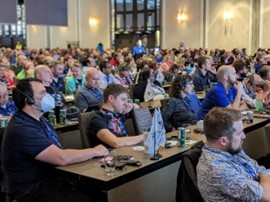

A few photos of your SP Executive at recent meetings, working hard for our SP members!
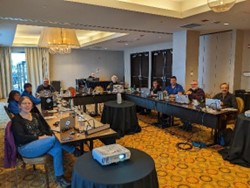
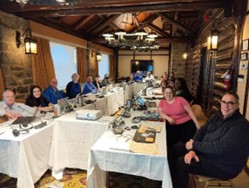
Comments about Canada Life from Members
We have been receiving a lot of inquiries about the Public Service Health Care Plan, concerning the implementation, delays in payments, the security breach and implications on international travel to some countries.
As a starting point, we recommend that members take a look at the PIPSC PSHCP guide. It explains, in depth, some of the more tricky plan provisions and how to deal with exceptions and appeals.
https://www.canva.com/design/DAFhZulAW_4/HDcUhJZ3H6GVoDBlzyZptg/view
Members with urgent unresolved issues can contact pensionsbenefits@pipsc.ca for support.
Highlighting a working member of the SP Group – Christopher Rinaldo
The SP Group continues to advocate for science! We want to ensure the voice of our scientists is protected and that our science based members continue to be recognized for the work that they do. With each issue of the newsletter we plan to highlight a member of the SP Group to show the diverse work our members do, and the value we provide to the Canadian public. This issue we would like to introduce Christopher Rinaldo!
Hello, my name is Chris and I am excited to share with you my role at the Radiation Surveillance Division within the Radiation Protection Bureau. In my role I get to work collaboratively with a passionate team to detect and monitor natural and non-natural radiation in the environment across Canada. This works helps to better understand long term trends in background radiation to facilitate risk assessment and management. This work also has an important role in identifying any human generated radioactivity present in the environment. To achieve these goals, I receive environmental samples such as air particulates and precipitation from Canadian Radiological Monitoring Network sites across the country which I then analyze using gamma spectroscopy. I also recently had the opportunity to work collaboratively with northern communities in Cambridge Bay, Nunavut to expand our sample collection and monitoring network. The data we generate is publicly available and can be found on the Open Government Portal for all Canadians to access and use.
Much of the human made radioactivity that we detect was produced by the open air testing of nuclear weapons which released large amounts of radionuclides such as cesium into the atmosphere. These radionuclides were then distributed globally by air currents and deposited around the world. Over many years some of these radionuclides have been bioaccumulated in trees and during forest fires when the trees burn these radionuclides are re-aersolized and released into the atmosphere where they can be picked up and detected using our monitoring equipment.
Radioactivity from human generated sources that we could detect can also come from incidents at nuclear power plants such as the incident at the Fukushima Daiichi nuclear power plant. The Fukushima Daiichi nuclear power plant accident released a plume of radioactivity which could be detected using the sampling and detection equipment that my team and I utilize.
The work that I perform on a daily basis is in support of long term monitoring projects that keep a close eye on levels of radioactivity in the Canadian environment. Our projects are tasked with monitoring and measuring radioactivity in the environment and we are constantly monitoring the environment (air, rain, soil, vegetation, food, milk) for the presence of natural and non-natural radionuclides. Normally this is done to establish what the baseline level of radioactivity present in the Canadian environment is. However, in the event of a nuclear emergency in Canada or abroad our monitoring network would provide vital data on the identity, presence, transit, and activity of radionuclides. As well, in a nuclear emergency situation we would be able to provide advice on sample collection and analyze special samples to provide additional data to responding agencies.
We keep watch for radioactivity because if something does happen and radioactivity is released, Canadians will immediately want to know where the radioactivity is coming from and where it is going. Therefore, we have a monitoring network setup and operating now to ensure we are ready in case of a nuclear incident. That way we will be able to answer questions about the new radioactivity in the environment and what the baseline levels of radioactivity in our environment currently are. This data can then be used to assess risks to Canadians and develop strategies for mitigating harm. The data that we generate on the baseline levels of radioactivity in the environment is useful as well in determining the types and levels of radioactivity that an average Canadian is exposed to over the course of a year.
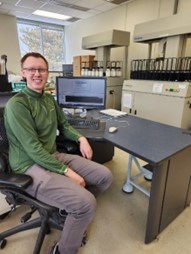
What is a union steward and how to become one? (written by Kevin Jacobs, SP Group Chief Steward)
Union stewards are volunteers which have taken training to advocate and represent members with respect to workplace issues. Stewards are the first point of contact between members and management and may be active on Union Management Consultation Teams, Occupational Health, and Safety Committees, or share information with a view to resolving problems and concerns. Stewards may also file grievances and other formal complaints with the employer on behalf of members. Contrary to popular culture most conversations with management are not adversarial and many issues can be resolved informally.
What is a grievance?
A grievance is a dispute or a complaint by either a member or the union. Every collective agreement contains a grievance procedure which outlines the steps and timelines to try to resolve a dispute between the parties. Not every complaint necessary will result in a grievance.
Do I have to be a lawyer to be a steward?
No, stewards are volunteers that receive specialized training from experienced PIPSC employment relations officers (EROs). Many EROs have labour law backgrounds. Stewards can receive additional in person training every year.
Will I be denied career advancement opportunities because I become a steward?
While some people may have negative animus towards unions, being a union steward provides numerous opportunities to expand one’s skill sets in the areas of labour relations, emotional intelligence, human resources, pay and finance which can help with career advancement. It is important to always be professional when representing members even though you might disagree.
Do I have use vacation or pay for my travel?
Time off for union business is addressed in most collective agreements. In the SP Collective Agreement Union Leave with Pay can be requested (leave code 641). The Institute will issue a letter, the employer will bill the Institute for your time and, you continue to get paid normally. For expenses, PIPSC reimburses members for reasonable expenses in accordance with policies for attending training. Information would be provided in your registration package.
I would like information, but I am not sure right now.
That is okay, more information on becoming a steward can be found here:
https://pipsc.ca/labour-relations/stewards/becoming-a-steward/become
There are many ways to become involved with PIPSC, consider attending an event or hosting a lunch and learn, reach out to your subgroup executive if you have one, or consider forming a subgroup with your colleagues.
Assisting a colleague with a problem and/ or resolving an issue that makes a real difference in someone’s life is one of the most satisfying things one can do in their career. We ask you to consider it. It is not as bad as you might think.
Chief Steward Judith Leblanc
Judith has been working on a number of initiatives for stewards such as training, recruitment, access to information and recognition. Our current priorities are member engagement and health and safety. A portal is under development to assist members in connecting with Stewards, and support for Stewards in the volunteer work that they do such as on Consultation Teams, Executive Groups and Committees.


Please reach out to a local SP Executive member if you would like to have a Stick up for Science sticker for your laptop!
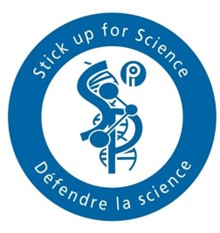
Quick Links:
Looking for the PIPSC calendar? You can download a copy for your desktop here:
https://pipsc.ca/member-tools/downloadable-calendar
Looking for a copy of the new Collective Agreement and updates on implementation? Information can be found here (link to the Collective Agreement is on the right side of the screen):
Reading Corner – I thought to share this article as it provided an interesting overview of the Union landscape and what is happening in 2024.
Need to update your contact information for PIPSC? That can be done here:
https://pipsc.ca/member-tools/change-of-address
We highly recommend doing this and using a personal (non-work) email address so you can receive timely information when you have no access to your work email, such as when you are on leave.
We need to remove barriers to participation in PIPSC, so our question to SP Members: What is a barrier for you, and what can your Union do differently? We welcome hearing from you on this!
Tanya Evans,
Communications Coordinator for the SP Group Executive Committee

